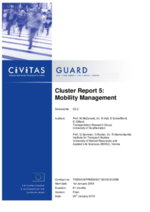Setting up a mobility agency and customised services
Thematic areas
Behavioural change & mobility management
Summary
As lack of accurate, accessible information is a major barrier to public transport use, the creation of a mobility agency can be an effective way to increase passenger numbers.
Implementing sustainable mobility
The mobility policy of the local authorities in Toulouse aims to promote real alternatives to the private car, especially for commuting (car use among commuters reached 77 percent in 2004, compared to a mere 7 percent for public transport). The goal is to reduce traffic congestion, which increased by 30 percent between 1996 and 2004, as well as energy consumption and related emissions of pollutants.
The Toulouse public transport authority (Tisseo) aimed to better serve its customers and, more generally, to boost the use of the public transport network and alternative mobility solutions in Toulouse by developing a website and creating a new central mobility agency.
The mobility agency was intended to:
- offer final users easily accessible mobility information and advice about existing public transport solutions in order to increase their use at conurbation level;
- integrate other mobility services (car pooling, transport on demand, bicycle rental) in order to promote modal solutions other than car use; and
- promote new mobility behaviour at individual and collective level (in relation to a commuter plan, for instance).
Progress
The measure was implemented in the following stages:
- The first local mobility agency was created by a local syndicate of towns located south east of Toulouse and Tisseo. This mobility agency opened in September 2005 and started by offering five different services — car pooling, bicycle rental, public information, mobility advice and public transport ticket sales.
- On the basis of the success of the first mobility agency, Tisseo decided to establish new mobility agencies to cover the entire territory of the agglomeration of Toulouse.
- The services, structure and business plans of the new mobility agencies at the level of intermodal nodes were defined.
Outcomes
The evaluation of the first mobility agency showed that:
- the information service answered to a real need among the public (around 200 visits per month plus 800 visits per month to the website);
- bicycle rentals increased by 80 percent between 2007 and 2008;
- ticket sales are a useful but non-essential activity of the mobility agency;
- 30 percent of interviewed people who were then drivers stated that they were willing to change their mode of transportation, the main obstacles being total journey duration and infrequent public transport services; and
- over 80 percent of people considered the concept of a mobility agency to be useful.








